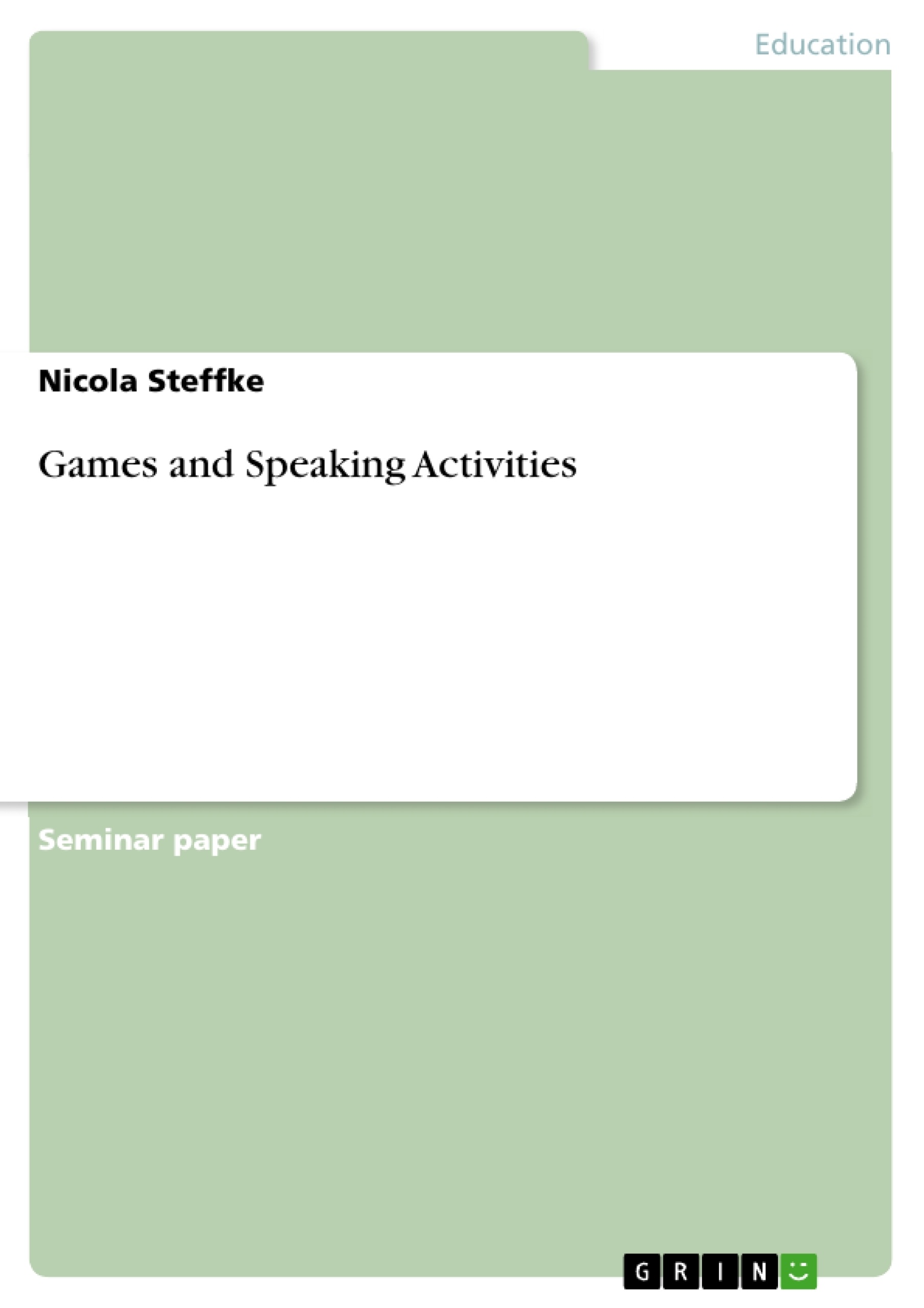This paper shows how important games and speaking activities in a foreign language learning class are.
It first concentrates on a theoretical part. Why should games be part of every effective class? What positive outcome is to be expected with playing? What aspects are important in order to play successfully? Here special emphasis is set on the atmosphere in class.
The following point includes the criteria for choosing a game. Various different factors have to be given deeper thought before you can even start planning the actual game. Often enough the major problems are not caused by the game itself but rather by class or time management. When all the preliminary problems are finally settled the chosen game will then have to be planned carefully always keeping in mind how it will be presented, how it will be carried out and how the topic of feedback will be treated.
The second major part of this paper deals with actual games. A selection of nine games is presented and critically evaluated showing problems or weak points, but also giving hints for successful playing or variations on the games. Here the focus lies mainly on games that were played during didactics courses. The participants then were asked to give their own personal view on these games or add from their own experience. A brief summing up of the main points that were discussed is given. What is important is that all the presented games have actually been played successfully.
The bibliography offers a more extensive list of game collections of different types and for different age groups.
The main aim is to show that games are not simple time fillers or rewards but should be accepted as useful learning situations.
Inhaltsverzeichnis (Table of Contents)
- Introduction
- The importance of games
- The importance of a nice atmosphere
- Criteria for choosing a game
- The process of the game
- Different examples of games
- Bingo
- Spot the Differences / Draw my Picture
- Baker Street / Quite a good party
- Four-in-a-row-verbs
- Tell us about
- Weekend Trip
- The Alibi Game
- Conclusion
Zielsetzung und Themenschwerpunkte (Objectives and Key Themes)
This paper aims to demonstrate the significance of games and speaking activities in foreign language learning classes, highlighting their benefits and exploring the process of their implementation.
- The effectiveness of games in promoting language acquisition and engagement.
- The role of games in fostering natural communication and developing key language skills.
- The importance of creating a positive classroom atmosphere conducive to learning.
- Practical considerations for selecting and implementing games effectively.
- A critical analysis of various games, including their strengths, weaknesses, and potential improvements.
Zusammenfassung der Kapitel (Chapter Summaries)
- Introduction: This chapter establishes the importance of games and speaking activities in language learning, emphasizing the evolution of their use and highlighting the need for their greater integration in classrooms.
- The importance of games: This chapter delves into the benefits of games in language learning, explaining how they promote natural communication, engagement, and skill development while minimizing the perceived effort involved in learning.
- The importance of a nice atmosphere: This chapter explores the significance of creating a positive and supportive learning environment for effective game implementation, recognizing the role of the teacher in fostering a welcoming and encouraging atmosphere.
- Criteria for choosing a game: This chapter outlines key factors to consider when selecting games for the classroom, emphasizing the need for careful planning, addressing potential logistical challenges, and ensuring alignment with learning objectives.
- The process of the game: This chapter focuses on the practical aspects of implementing games, highlighting the importance of clear instructions, effective presentation, and structured feedback mechanisms to enhance the learning experience.
- Different examples of games: This chapter presents a selection of games, providing a critical evaluation of their strengths, weaknesses, and potential for improvement based on practical classroom experience.
Schlüsselwörter (Keywords)
This paper focuses on the use of games and speaking activities in foreign language learning, exploring their benefits, implementation strategies, and practical examples. Key themes include communication, engagement, learning objectives, classroom atmosphere, game selection, and critical evaluation of various games.
Frequently Asked Questions
Are games in language classes just for fun?
No, the paper argues that games are useful learning situations that promote natural communication and engagement, rather than just simple rewards or time fillers.
What are the criteria for choosing a successful classroom game?
Factors include learning objectives, class and time management, and the specific needs of the age group, requiring careful planning and presentation.
Why is the classroom atmosphere important for games?
A positive and supportive atmosphere is essential for students to feel comfortable communicating and engaging in the activities without fear of making mistakes.
Which specific games are evaluated in this paper?
The paper analyzes games like Bingo, "Spot the Differences", "The Alibi Game", and "Tell us about", providing critical feedback on their implementation.
How should feedback be handled after a game?
Feedback should be structured and integrated into the game process to reinforce learning while maintaining the positive experience of the activity.
- Citation du texte
- Nicola Steffke (Auteur), 2003, Games and Speaking Activities, Munich, GRIN Verlag, https://www.grin.com/document/56216



